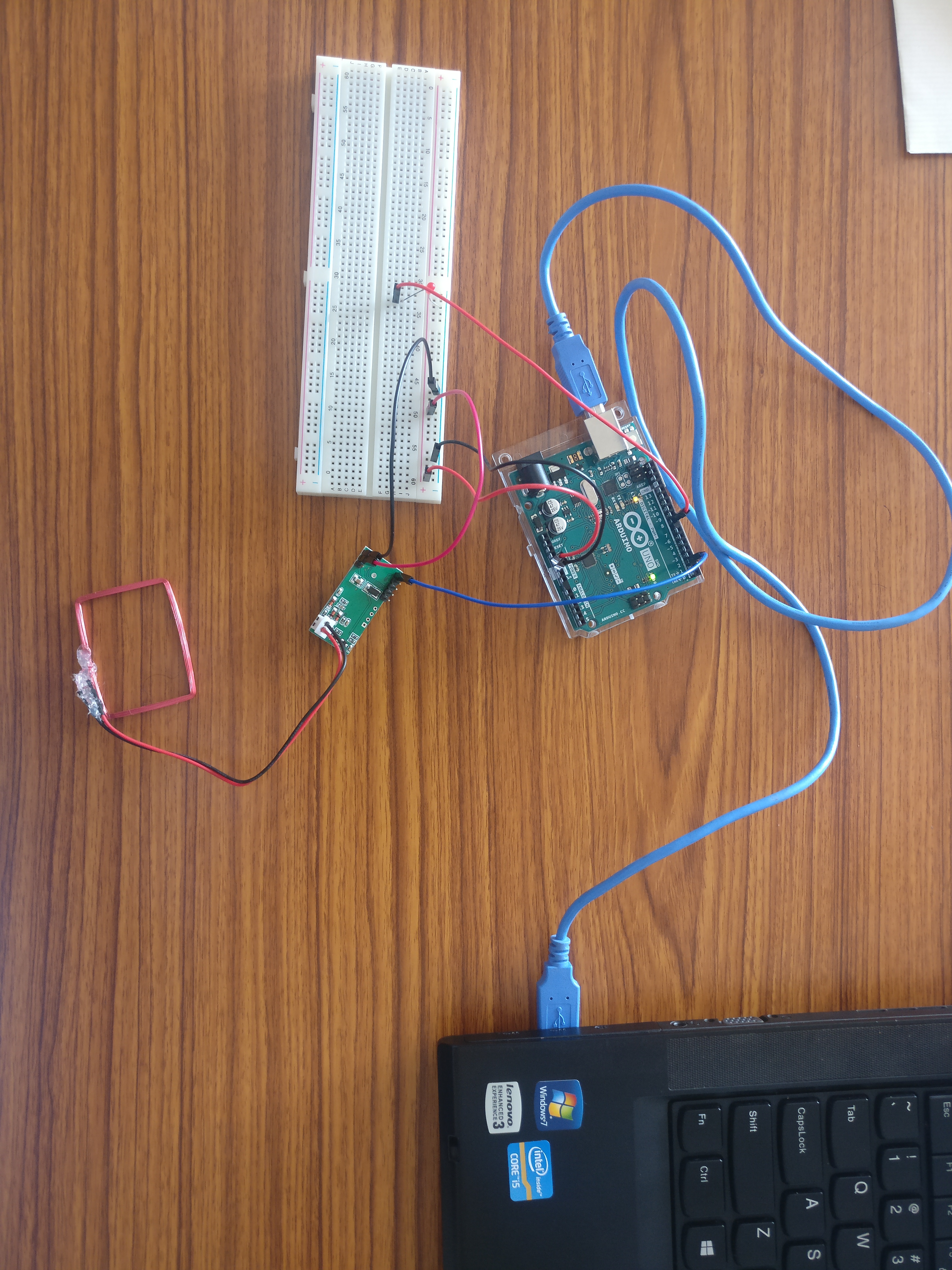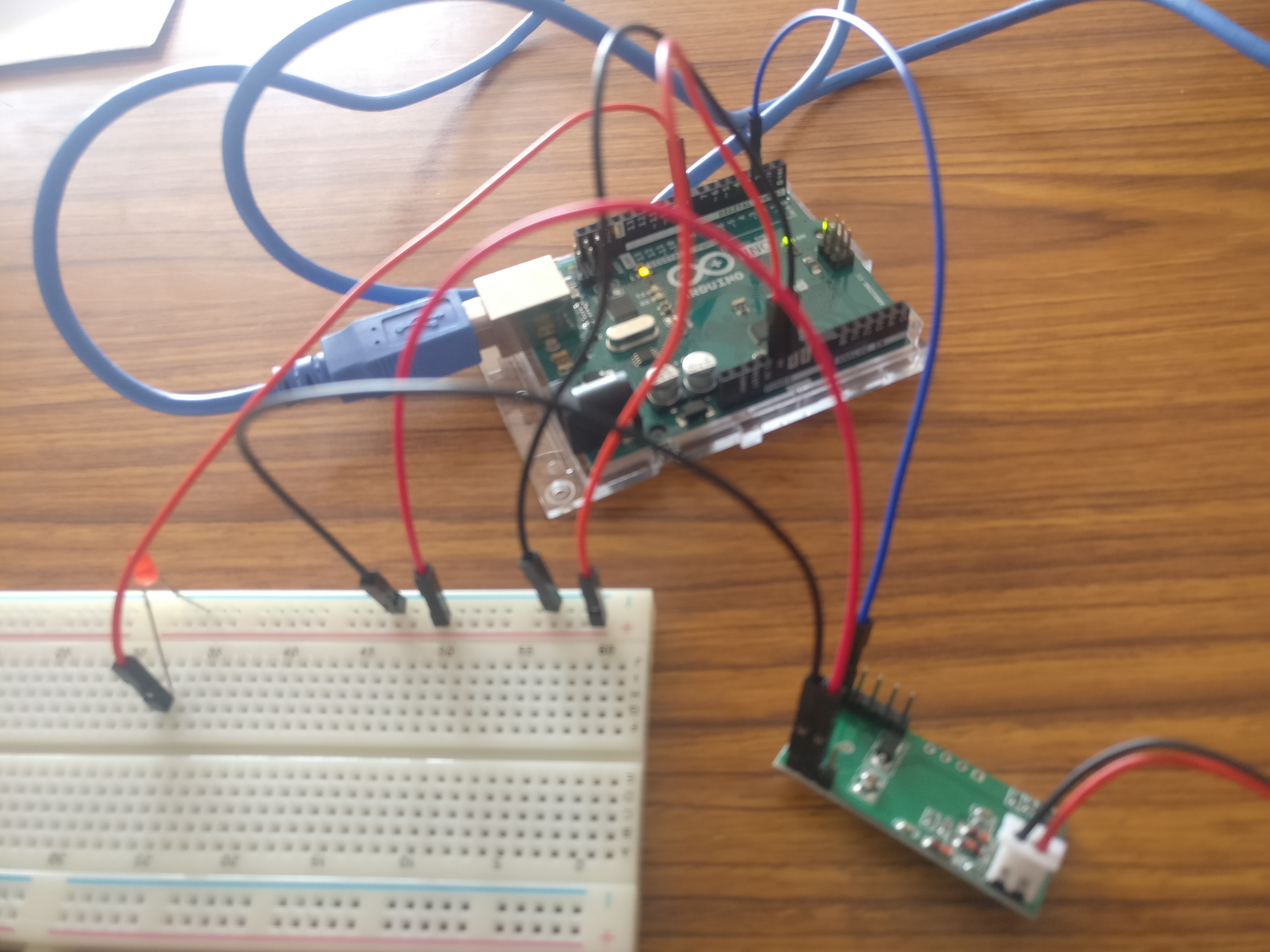Recently I was working on an RFID access control system for Makerspace where I am working. I have used Arduino Uno and RDM6300 for prototyping. You may wonder why I used RDM6300 instead of popular RC522 reader module. Students who study in the campus were already issued ID cards with RFID tags of 125KHz frequency. So, RC522 is not an option as a reader, because RC522 is 13.56 MHz Reader.


For 125KHz tags, we can either use RDM630 or RDM6300 as reader module. Both have the same pin layouts. But RDM630 is superior in functionality and little costlier. I ordered RDM6300 from Amazon without aware of its multi-read behaviour. That is RDM6300 will read the same tag continuously if it's put near the reader for a long time. While RDM630 will read the same tag only once. So, when I use the output of this reader to trigger a hardware like an opening door if the tag is authorised, it will trigger multiple times if the card placed near the reader for a while.
To tackle this issue, I have tried several ways like clearing input buffer, set up a delay etc. But none of them gave me the perfect solution. The problem with Serial input buffer is that we don't have control over it and Arduino doesn't provide a way to clear input serial buffer.
So, I finally come up with a solution for this. I managed the triggering process completely in software part rather than depending on hardware Serial communication. What I did is that I have stored the previous tag information in a variable called previous_tag and compared it with currently read tag. If they are not matching, then we can trigger the hardware or door. And when there is no serial communication happening, I will reset this previous_tag to zero. This solution is working perfectly for me to control the door using RDM6300 RFID reader module.
Connection
RDM6300 5V - Arduino 5V
RDM6300 GND - Arduino GND
RDM6300 TX - Arduino PIN 2
Connect antenna in the antenna pins of reader
Arduino PIN8 - LED Positive leg
Arduino GND - LED negative leg
Code
This is my tweaked version of code originally posted in this website
#include <SoftwareSerial.h>
const int BUFFER_SIZE = 14; // RFID DATA FRAME FORMAT: 1byte head (value: 2), 10byte data (2byte version + 8byte tag), 2byte checksum, 1byte tail (value: 3)
const int DATA_SIZE = 10; // 10byte data (2byte version + 8byte tag)
const int DATA_VERSION_SIZE = 2; // 2byte version (actual meaning of these two bytes may vary)
const int DATA_TAG_SIZE = 8; // 8byte tag
const int CHECKSUM_SIZE = 2; // 2byte checksum
SoftwareSerial ssrfid = SoftwareSerial(2,3);
uint8_t buffer[BUFFER_SIZE]; // used to store an incoming data frame
int buffer_index = 0;
unsigned long previous_tag = 0L;
void setup() {
pinMode(8,OUTPUT); //led pin
Serial.begin(9600);
ssrfid.begin(9600);
ssrfid.listen();
Serial.println("INIT DONE");
}
void loop() {
if (ssrfid.available() > 0){
bool call_extract_tag = false;
int ssvalue = ssrfid.read(); // read
if (ssvalue == -1) { // no data was read
return;
}
if (ssvalue == 2) { // RDM630/RDM6300 found a tag => tag incoming
buffer_index = 0;
} else if (ssvalue == 3) { // tag has been fully transmitted
call_extract_tag = true; // extract tag at the end of the function call
}
if (buffer_index >= BUFFER_SIZE) { // checking for a buffer overflow (It's very unlikely that an buffer overflow comes up!)
Serial.println("Error: Buffer overflow detected!");
return;
}
buffer[buffer_index++] = ssvalue; // everything is alright => copy current value to buffer
if (call_extract_tag == true) {
if (buffer_index == BUFFER_SIZE) {
unsigned tag = extract_tag();
Serial.println(tag);
if(previous_tag == tag){
// Serial.println("Same tag ===================");
}
else{
//put the triggering code here digitalWrite(8,1); delay(1000); digitalWrite(8,0); //Serial.println(previoustag); //Serial.println(tag); previoustag = tag; }
} else { // something is wrong... start again looking for preamble (value: 2)
buffer_index = 0;
return;
}
}
}
else{
// Serial.println("NO Cards detected ++++++++++++++++++++++++++++++++++");
previous_tag = 0L; // reset previous tag
}
}
unsigned extract_tag() {
uint8_t msg_head = buffer[0];
uint8_t *msg_data = buffer + 1; // 10 byte => data contains 2byte version + 8byte tag
uint8_t *msg_data_version = msg_data;
uint8_t *msg_data_tag = msg_data + 2;
uint8_t *msg_checksum = buffer + 11; // 2 byte
uint8_t msg_tail = buffer[13];
// print message that was sent from RDM630/RDM6300
Serial.println("--------");
Serial.print("Message-Head: ");
Serial.println(msg_head);
Serial.println("Message-Data (HEX): ");
for (int i = 0; i < DATA_VERSION_SIZE; ++i) {
Serial.print(char(msg_data_version[i]));
}
Serial.println(" (version)");
for (int i = 0; i < DATA_TAG_SIZE; ++i) {
Serial.print(char(msg_data_tag[i]));
}
Serial.println(" (tag)");
Serial.print("Message-Checksum (HEX): ");
for (int i = 0; i < CHECKSUM_SIZE; ++i) {
Serial.print(char(msg_checksum[i]));
}
Serial.println("");
Serial.print("Message-Tail: ");
Serial.println(msg_tail);
Serial.println("--");
long tag = hexstr_to_value(msg_data_tag, DATA_TAG_SIZE);
Serial.print("Extracted Tag: ");
Serial.println(tag);
long checksum = 0;
for (int i = 0; i < DATA_SIZE; i+= CHECKSUM_SIZE) {
long val = hexstr_to_value(msg_data + i, CHECKSUM_SIZE);
checksum ^= val;
}
Serial.print("Extracted Checksum (HEX): ");
Serial.print(checksum, HEX);
if (checksum == hexstr_to_value(msg_checksum, CHECKSUM_SIZE)) { // compare calculated checksum to retrieved checksum
Serial.print(" (OK)"); // calculated checksum corresponds to transmitted checksum!
} else {
Serial.print(" (NOT OK)"); // checksums do not match
}
Serial.println("");
Serial.println("--------");
return tag;
}
long hexstr_to_value(char *str, unsigned int length) { // converts a hexadecimal value (encoded as ASCII string) to a numeric value
char* copy = malloc((sizeof(char) * length) + 1);
memcpy(copy, str, sizeof(char) * length);
copy[length] = '\0';
// the variable "copy" is a copy of the parameter "str". "copy" has an additional '\0' element to make sure that "str" is null-terminated.
long value = strtol(copy, NULL, 16); // strtol converts a null-terminated string to a long value
free(copy); // clean up
return value;
}
`
This is a working demonstration of single read of tag using RDM6300.